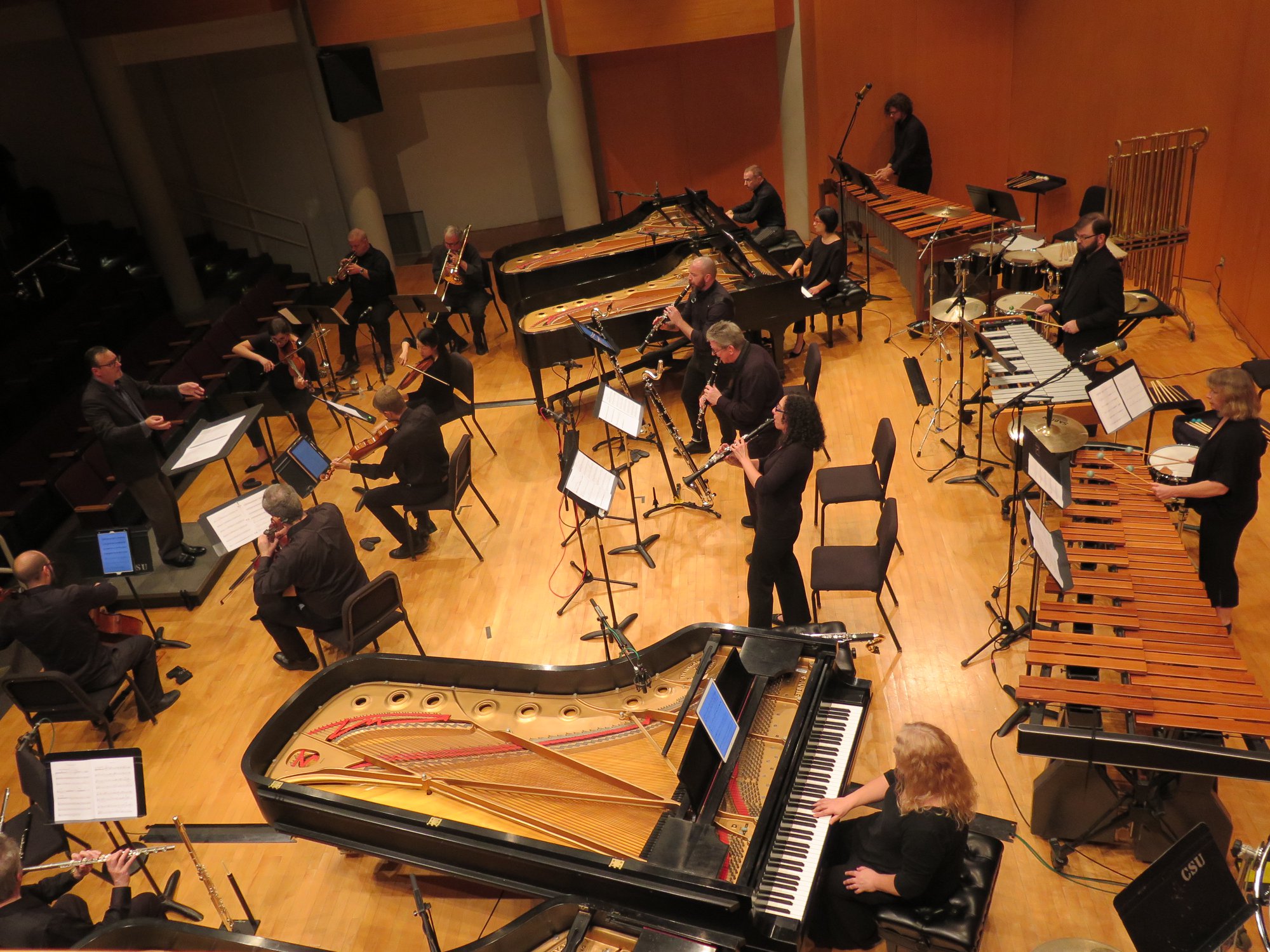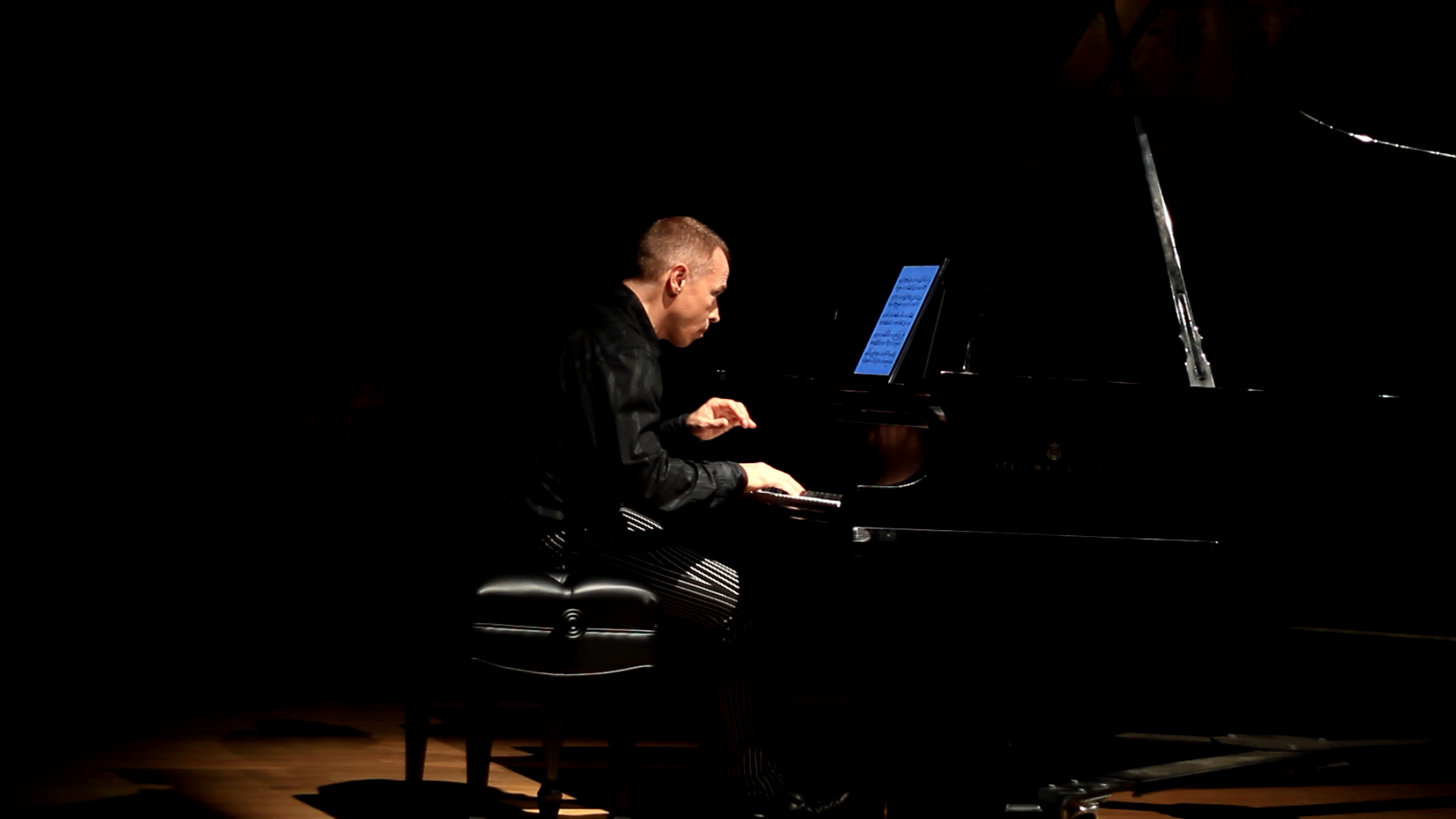by Mike Telin

The problem with many works that are driven by a social narrative is that while you may have strong feelings about the message, you’re left asking yourself — is this a piece I want to listen to? Will it survive the test of time?
The answer here is a resounding yes as Rindfleisch’s use of color, dynamics, rhythm, and musical contour easily hold your attention throughout the twenty-minute, seven-movement parade of contemptuous individuals, groups, and ideas.
The work is scored for an ensemble of flutes, clarinets, trumpet, trombone, violins, viola, and cellos, as well as four grand pianos and enough percussion to keep four players busy. This performance brought together a dream team of twenty players from the Cleveland-based ensembles No Exit and Ars Futura, Minneapolis-based Zeitgeist, Boston-based Transient Canvas, and a few guests.
While Rindfleisch never goes so far as to mention anyone or any particular group by name, it is clear that American Monster is a commentary on today’s political climate in the United States.
Bangs and shrieks open “An Immoral Stench Wins the Day.” The sounds of a trio of bass clarinets slowly evolve into cacophony by the full ensemble until a final thump in the low register of a piano brings things to closure.
A brass fanfare announces “The Largest Crowds in the History of the Universe,” while the percussion section leads the “March of the Cowardly Sycophants.” The trio of bass clarinets move from side to side as they mock the political officials who have chosen to abandon dignity.
The center movement, “Interlude: Reminiscence,” begins with a soft tremolo in the marimba and vibraphone. Lyrical strings are joined by alto flutes and a trio of clarinets in a chorale that asks ‘remember when the days were calm?’
“Cruelty is Fun!” is defined by string harmonics in the high register along with screeching winds, punctuated chords in the pianos, and stopped cymbal bangs.
The brief “Supporters, Friends and Loyalists” begins with tongue slaps in the flutes. Short, muted brass notes transition into a demonic march ending in a loud chord.
American Monster concludes with a sign of hope. “Enemies: Everyone Else” opens with a single note in the marimba that is joined by simple musical ideas in the pianos. The volume grows as instruments are added, until triumphant chimes accent the now unified sound world, and the final note fades into nothingness.
Conducting with a clear beat, Andrew Rindfleisch shaped each movement with care, drawing a full dynamic range, rhythmic precision, and a cohesive blend from the musicians. A great performance of a work that left you with plenty to ponder.
Things took a lighter turn with the premiere of Greg D’Alessio’s Running with the Devil for video/audio media. The clever work takes a satirical and often cynical look at popular culture, religion, and music. Casting himself as the protagonist, D’Alessio takes on many guises during the video’s six segments, each of which ponders questions such as: can writing a piece of music actually change society? Are Facebook and Twitter the real enemy? There are also musings about Bozo the Clown, and an unusual Communion — the feeding of gummy bears to children wearing paper masks. D’Alessio’s electronic score wonderfully underpins these topics which leave you wondering if society really is being overrun with lemmings.
The second half of the thought-provoking evening was dedicated to a single work — Frederic Rzewski’s monumental set of 36 variations for solo piano, The People United Will Never Be Defeated! Based on an anthem for the Popular Unity movement in Chile, the work requires immense technical ability, a broad color palette, a keen sense of timing, and unwavering concentration from the performer.
Presenting this magnum opus for the first time is akin to a first outing with the Goldberg Variations, and making his debut performance with the work was the talented Geoffrey Burleson. Throughout the hour-long work the pianist nimbly negotiated Rzewski’s thorny writing with ease. His playing was never hurried and although some of the transitions didn’t quite flow, he provided the piece with a well-conceived structural arc. Burleson is a pretty good whistler too. The pianist was in his element during his electrifying improvisation before the return of the theme.
Tackling this piece is a big undertaking and Burleson was up to the task. Hopefully he’ll be back with a second performance of it in the future.
Published on ClevelandClassical.com October 23, 2018.
Click here for a printable copy of this article




